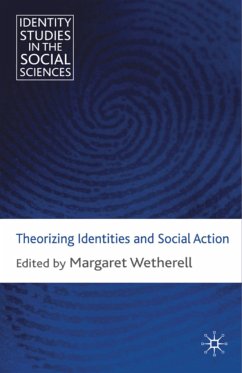
Identities in Action (eBook, PDF)
Developments in Identity Theory
Redaktion: Brenner, Philip S.; Serpe, Richard T.; Stets, Jan E.
Versandkostenfrei!
Sofort per Download lieferbar
120,95 €
inkl. MwSt.
Weitere Ausgaben:

PAYBACK Punkte
60 °P sammeln!
This volume presents recent developments in identity theory and research. Identities are the basic building blocks of society and hold a central place in every social science discipline. Identity theory provides a systematic conceptualization of identities and their relationship to behavior. The research in this volume demonstrates the usefulness of this theory for understanding identities in action in a variety of areas and settings. The volume is organized into three general areas: ethnicity and race; family, religion, and work; and networks, homophily, and the physical environment. This com...
This volume presents recent developments in identity theory and research. Identities are the basic building blocks of society and hold a central place in every social science discipline. Identity theory provides a systematic conceptualization of identities and their relationship to behavior. The research in this volume demonstrates the usefulness of this theory for understanding identities in action in a variety of areas and settings. The volume is organized into three general areas: ethnicity and race; family, religion, and work; and networks, homophily, and the physical environment. This comprehensive and authoritative volume is of interest to a wide readership in the social and behavioral sciences, including students and researchers of sociology, social psychology, psychology, and other social science disciplines.
Dieser Download kann aus rechtlichen Gründen nur mit Rechnungsadresse in A, B, BG, CY, CZ, D, DK, EW, E, FIN, F, GR, HR, H, IRL, I, LT, L, LR, M, NL, PL, P, R, S, SLO, SK ausgeliefert werden.












